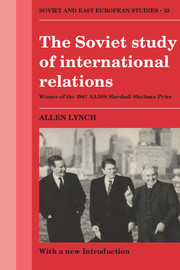Book contents
- Frontmatter
- Contents
- Foreword by Curt Gasteyger
- Acknowledgements
- INTRODUCTION: THE “ NEW POLITICAL THINKING” AND SOVIET FOREIGN POLICY: INTELLECTUAL ORIGINS AND POLITICAL CONSEQUENCES
- INTRODUCTION TO THE FIRST EDITION
- 1 THE BACKGROUND: MARX, LENIN, STALIN AND THE THEORY OF INTERNATIONAL RELATIONS
- 2 THE DEVELOPMENT OF SOVIET POLITICAL STUDIES
- 3 APPROACHES TO INTERNATIONAL RELATIONS
- 4 THE SYSTEMS APPROACH AND INTERNATIONAL RELATIONS
- 5 THE STRUCTURE OF THE INTERNATIONAL SYSTEM: THE SYSTEMS LEVEL
- 6 CRITICAL SUBSYSTEMS
- 7 THE SCIENTIFIC–TECHNICAL REVOLUTION AND THE CHANGING FACE OF INTERNATIONAL RELATIONS
- CONCLUSION
- Notes
- Bibliography
- Index
- SOVIET AND EAST EUROPEAN STUDIES
- Frontmatter
- Contents
- Foreword by Curt Gasteyger
- Acknowledgements
- INTRODUCTION: THE “ NEW POLITICAL THINKING” AND SOVIET FOREIGN POLICY: INTELLECTUAL ORIGINS AND POLITICAL CONSEQUENCES
- INTRODUCTION TO THE FIRST EDITION
- 1 THE BACKGROUND: MARX, LENIN, STALIN AND THE THEORY OF INTERNATIONAL RELATIONS
- 2 THE DEVELOPMENT OF SOVIET POLITICAL STUDIES
- 3 APPROACHES TO INTERNATIONAL RELATIONS
- 4 THE SYSTEMS APPROACH AND INTERNATIONAL RELATIONS
- 5 THE STRUCTURE OF THE INTERNATIONAL SYSTEM: THE SYSTEMS LEVEL
- 6 CRITICAL SUBSYSTEMS
- 7 THE SCIENTIFIC–TECHNICAL REVOLUTION AND THE CHANGING FACE OF INTERNATIONAL RELATIONS
- CONCLUSION
- Notes
- Bibliography
- Index
- SOVIET AND EAST EUROPEAN STUDIES
Summary
This examination of the Soviet study of international relations largely confirms the working hypothesis that, under the shadow of nuclear weapons, Soviet analyses of world politics have evolved markedly from the model offered by Lenin. The movement, first noted by Zimmerman, toward increasing methodological self-consciousness, has been continued and consolidated in recent years. There is a broad recognition among Soviet foreign policy intellectuals of the need to go beyond traditional Soviet categories of political economy in dealing with international relations. Soviet studies of the subject are increasingly characterized by the great importance attached to (a) politics, which is conceded to be substantially independent of its economic “base”; (b) the state, and even the nation-state, as opposed to classes; and (c) the “system” of international relations.
The original Leninist deduction of international–political behavior from the class character of specific states, projecting, as Liska has noted, “the alleged internal contradictions of capitalism onto the international arena,” has been qualified in so many ways that its operational significance for Soviet theorists may be questioned. Certainly the bitter dispute with communist Yugoslavia after 1948, and especially the Sino-Soviet schism, are inexplicable by a theory which ascribes the wellspring of all “antagonistic” contradictions to inter-class struggle.
- Type
- Chapter
- Information
- The Soviet Study of International Relations , pp. 140 - 148Publisher: Cambridge University PressPrint publication year: 1987

